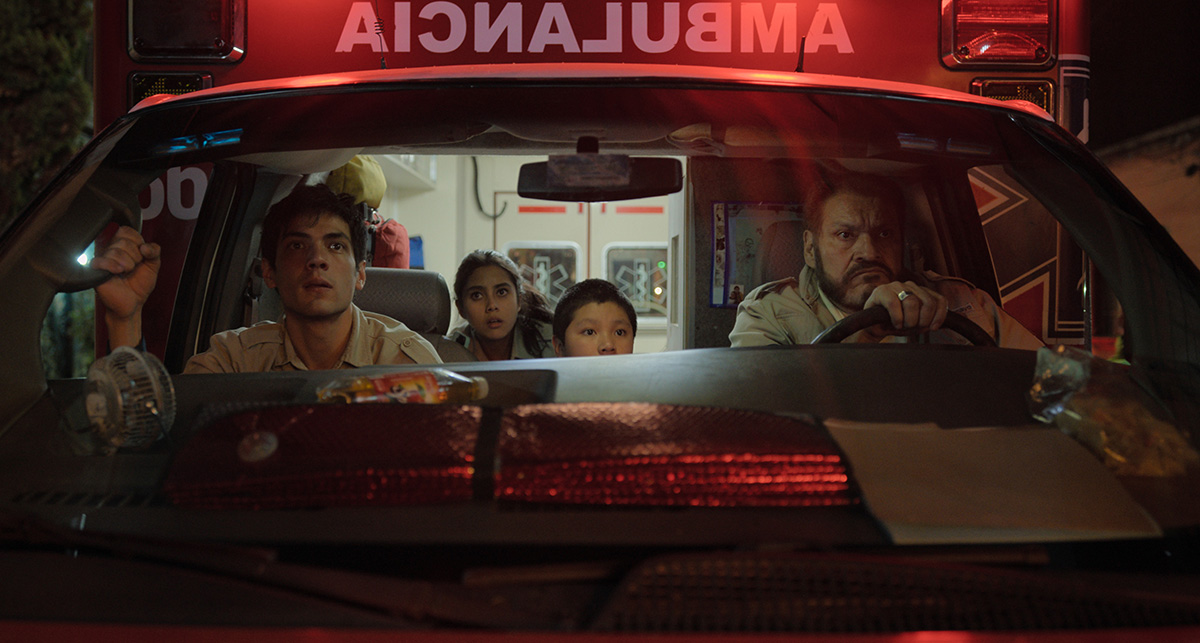Apple TV+ continues to expand its already promising catalog of international series, this time with the Latino medical drama, Familia de Medianoche aka Midnight Family. Inspired by the Mexican-American documentary of the same name, written and directed by Luke Lorentzen, and created for television by Gibrán Portela (The Untamed) y Julio Rojas (La Jauría), the series Midnight Family follows the comings and goings of a feisty family of paramedics as they respond to emergency calls in Mexico City, one of the most densely populated entities in the world. Executive produced by Pablo Larraín y Juan de Dios Larraín (Una Mujer Fantástica), the first two episodes arrive on the streaming service on Wednesday, September 25.
What You Need to Know About Midnight Family
In the always vibrant and congested Mexico City, public ambulance services are provided by the Rescue and Emergency Medical Squadron and the Red Cross. But, together both agencies have less than 100 ambulances to provide pre-hospital care to almost 10 million inhabitants, and as a consequence, people end up resorting to an informal network of private ambulances. “This is not a minor issue and we hope it will have a fairly massive reach. These are issues that affect us all,” series director Natalia Beristáin told El Universal.
Apple TV+’s latest offering Midnight Family takes place in this tense healthcare setting and portrays the experiences of the Tamayo family, owners and operators of one of the many private ambulances serving the Mexican capital. The series immediately takes us inside the self-run ambulance, bringing us elbow-deep in high-tension scenes.
Night after night, the Tamayo clan, made up of Marigaby, Ramón, Marcus, and Julito, roam the effervescent streets of their city, striving to both save lives and earn a living. At the center of it all is young Marigaby Tamayo (Renata Vaca), an assertive medical student who has evolved into an exceptional paramedic. Alongside her is family patriarch Ramón (Joaquín Cosío), a veteran of pre-hospital care who himself is facing a delicate diagnosis. Then there’s her older brother Marcus (Diego Calva), a paramedic given to rap who’s figuring out his identity outside of his family. And finally, we have the youngest of the Tamayo family, Julito (Sergio Bautista), the “morrito” who evades his school responsibilities and only thinks about possible adventures in the ambulance.
As you might imagine, the Tamayos put their lives on the line in the race to save others. One night, they help a girl who was beaten by her boyfriend, and the next, they face gun violence. In episodes like “The Earthquake,” “Lucha Libre,” and “Limited Time,” we see intense and intentionally shocking events that shake the senses. And certainly, when it comes to matters of life and death, we find it hard to take our eyes off the screen.
The True Story Behind Midnight Family
In December 2015, art historian and filmmaker Luke Lorentzen was enjoying an evening stroll through the Roma, a central neighborhood of the Mexican capital, when he came across a 9-year-old boy, Josué Ochoa, who was stubbornly playing ball almost inside a private ambulance. Intrigued, Lorentzen approached the group of paramedics who were maintaining the unit and began to inquire about their work.
That same night, the director accepted the invitation of Fernando Ochoa and his sons, Juan and José, to climb into the self-operated ambulance and witness from the inside the profession of emergency medical technicians aka EMTs. “That first night I saw this incredible, tragic, absurd underworld of private ambulances that are getting to accidents that the government is not getting to,” Lorentzen told the Chicago Tribune. After that chance encounter and, upon discovering the shortcomings of the capital’s healthcare system, the Connecticut-born director knew immediately that he was going to create a documentary piece about this industry.
By 2019, Lorentzen’s Familia de Medianoche had received outstanding reviews and won major awards at the Sundance Film Festival and the Guadalajara International Film Festival. Praised by Rolling Stone as “eye-opening” and by Roger Ebert as “profound and thrilling,” the documentary laid the groundwork for a scripted adaptation, and in March 2022, Apple TV+ picked up the project.
What the Apple TV+ Adaptation Brings to the Table
Fortunately, the adaptation by Natalia Beristáin and her screenwriter, Gibrán Portela captures the essence, meaning, and core elements of Lorentzen’s original piece. Now, far from being a loose carbon copy, the scripted version broadens and adds depth to the themes, characters, and conflicts we met in 2019.
The reimagining of the Tamayos’ life not only makes the protagonists more relatable and empathetic but also shows more clearly the costs of their profession. That said, the new version of Familia de Medianoche is, first and foremost, a testament to the unwavering dedication of paramedics, particularly in spite of the physical dangers, economic climate, and emotional dilemmas that accompany their work.
As a scripted show, Midnight Family also has more narrative tools at its disposal. Unlike Lorentzen’s documentary, the Apple TV+ series uses voiceover to achieve moments of astonishing intimacy. In turn, the evocative music selection brings to light the urban texture of Mexico City and manages to underscore both the tone of the family drama within the medical one.
Throughout its 10 episodes, Apple TV+’s Midnight Family proves that, with the same source material, new and evocative versions can be developed. Although at times it veers into telenovela territory, hopefully it will continue for many more seasons. Mexican EMTs deserve to have their stories told in such beautiful, evocative ways.

